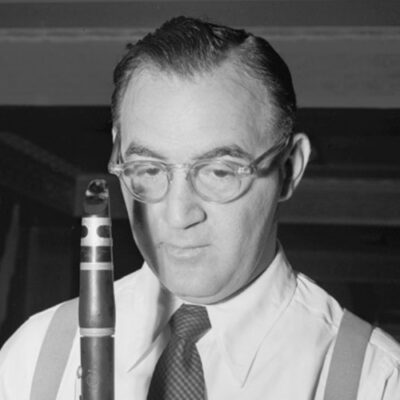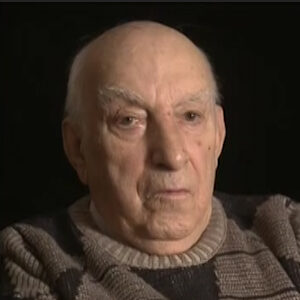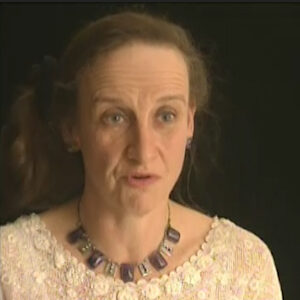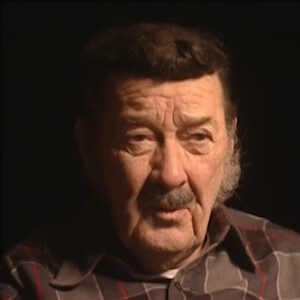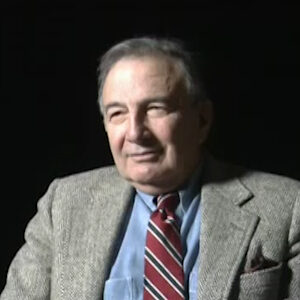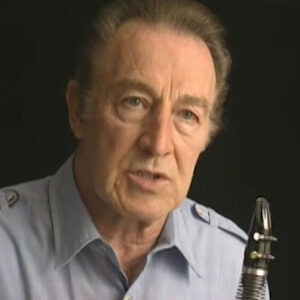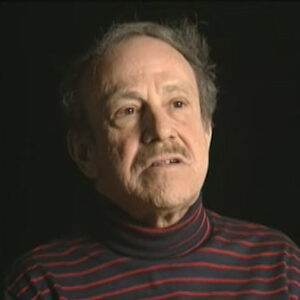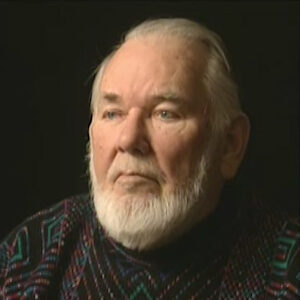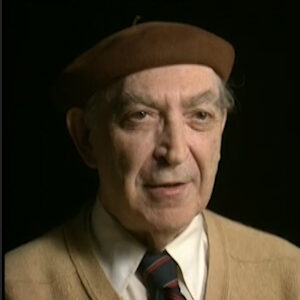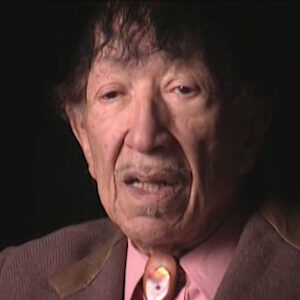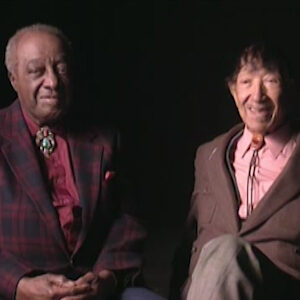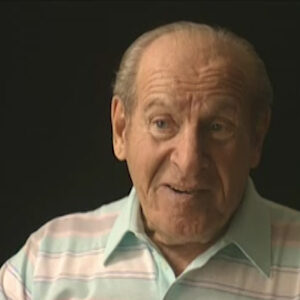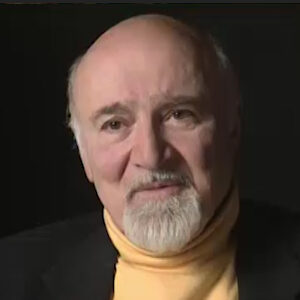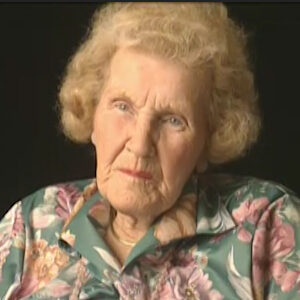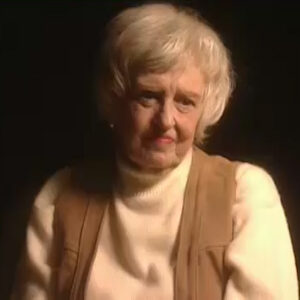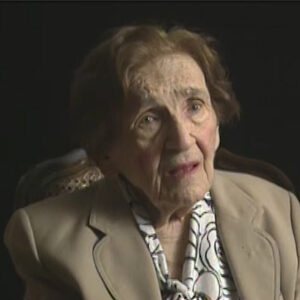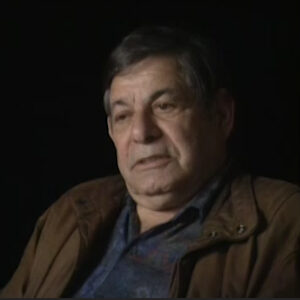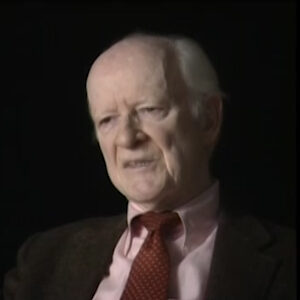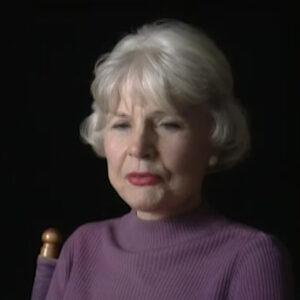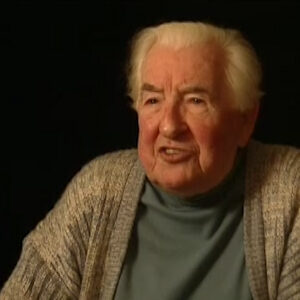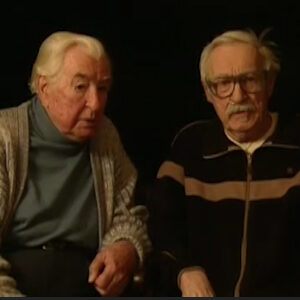Speaker I think it was on a recording session. I know it was it was a rehearsal with Joe Haimes band. Chris Chris and I were in the section and the singing trio came and two guys and a girl do set brothers. And Helen O’Brien found out later. Those were the names. And Chris and I went, Wow. Boy, she is. Wow, you know. And.
Speaker And so it turned out that Chris and Helen had eyes for each other, so to speak. But Helen’s mother never let her out of her sight. And we use all kinds of dodges to get Helen’s mother away from her in the bus, taking her to the back of the bus, telling her stories and things so Chris and Helen could neck. And anyway, they wound up eloping. Much to the chagrin of Helen’s mother and Helen’s father, who was a police captain in Philadelphia when none of us had ever met him. But we all called him hard Çok O’Brien, just because he was a cop. And they didn’t like the idea and all of them getting married, but they eventually come home at once. All is forgiven style. And. And I you and I know that question. Helen had five children and was at the house a number of times after they were married. I haven’t seen either one of them since before the war, but I’m sure we’re still the best of friends, as always.
Speaker Held that when you first heard many good and you said it was.
Speaker I, I, I, I, I think. And be careful to let my question finish. Right? Yeah, yeah, I caught that.
Speaker I think the first time I heard about the Benny Goodman band was we’ll know what the Congress Hotel in Chicago sometime around the end of 1935. And like all the other musicians, it was a tremendous experience. I mean, listening, hearing Benny play the tightness of the band swing and Feel, which was not no other band had. And it was I immediately went out and bought the record of King Porter Stomp like, I’m sure thousands of other dead. But from then on, I was hooked. And as a matter of fact and Joe Haimes band, we we would all Joe would have the band take our intermission and wherever we were, like the ballrooms and the amusement parks and places like that, which was which were really very large venues for all the dance bands and all the cars would be parked out the back of the bandstand.
Speaker Everybody go out the back, the bandstand precisely at 11 o’clock to catch the Beni’s broadcast. As an example, like from the Palladium in California.
Speaker And it was during a break like that that you first got the call, that you tell the story the way you told me.
Speaker Well, one night one night, we were all listening to the broadcast from the back of the ballroom and Cincinnati amusement park called Coney Island. It’s about 10 or 15 miles out of town. And as as always, you know, we just sat listening, drinking and every note that was played. And we’d get back to the Hotel Fountain Square Hotel in Cincinnati. And there was a message for me from some long distance operator number seven and so on. I put the call. She says, just a minute, I’ll try to get your party. You just go ahead. And a voice comes on the phone, says, Hello, Zeke, this is Benny Goodman. Well, I was stunned. I didn’t know what to say. You know, having been listening every night to the looking forward, we had to look forward to get out of the cars. It a mission to listen to the band. And so he said, how about we’d like you to come with the band? He says, Chris told me to call you. Right. What I said was, sure, you know. Right. So he says, well, here, let me put Chris on.
Speaker Chris got on and we had it and he’d said, you better get it. Get yourself a trumpet. And I was playing a cornet then. And I said, get the trumpet and get a white suit. And I said, Here’s Benny.
Speaker Benny came on and said, You’ll love we’ll make you in Salt Lake City, which will be the first one night stand out of the Palladium. Such and such a date. It was early June, I think. Well, I have just turned 21 on June the 12th. So a few days before that. So what was right in that week? And I can’t I can’t begin to tell you my feelings of like it’s suddenly being thrown to the top of the world.
Speaker I ruined that shot. No. Okay. Shift. My face in.
Speaker If in case it comes up again, essentially the Palomar where he just finished, what did I say? That Palladium. Oh yeah, right.
Speaker Oh, you want me to make maybe do do the bidding, get back on the phone. That’s good to see you. Are you moving in?
Speaker That’s gonna make my nose bigger. You know, you’re you’re talking to a photographer, a vain. Chances are I’m not vain. I’ve been a photographer all my life. And the thing that I hate. There’s one distortion as a matter of distance of the lens to the subject. You know, I don’t care what lens you use.
Speaker Like one hundred and one hundred and five millimeter as the best lens for portraiture. Because you come back up and get a head and shoulders shot.
Speaker Tick. Start again from Benny, got back on the phone on.
Speaker And after Chris Christie said get away soon. OK. And you can take the lead. They just finished going to be one night stand. It was the first day after their Calamar.
Speaker OK, so anyway, Chris said. Here’s Benny again.
Speaker And Benny came back on and said, We’ll meet you in Salt Lake City. Such and such hotel will be our first one night stand outside of the Palomar Ballroom, which I did. So I which this was about a week after we talked that I had to meet him.
Speaker I went I bought a trumpet and a white suit and I met them. I came the next day after I was there and we all went out to the salt air ballroom. Bye bye cabs and set up in start setting up. And they had 7000 people in there waiting for us to play. Somebody said, where’s the box? You know, the library, books, music and everybody’s turn the right turns around looking for him. And it turned out that Benny’s younger brother, Gene, who was the band boy and I had dated all of a sudden, speaks such as, oh, I guess I left them on a train. The band had their own Pohlman for the tour back east. So Gene one went back, took a cab back there, and Benny said, well, let’s play anyway. And Hymies shirts are started to laugh and said, We got three nomen the band Benny.
Speaker It’s like, what do we owe? Benny said. Let’s play Blue Skies. That’s what he said. He says, Let’s play blue skies. And he looked up at me and said, You know, blue skies aren’t your pops out. And wow. So he said, let’s play it anyway. And so the band played for about 45 minutes, something like that, without any music.
Speaker And also the guys, you know, when you’re in a band, you appeal, you learn the arrangements in a matter of two to three weeks. You practically don’t have to take anything out of the box excepting new numbers. And that was my first night in a band. And for me and a Vito Musso and Sterling Bozo’s was I no man also. But he was subbing from a leave out of Ray Noble’s band, but was pretty exciting. I want to tell you.
Speaker Tell that Vito being joining the band at the same time, as you see, there’s quite a character and two guys in the band. Appreciate it.
Speaker It’s been a contrast to a Vito Mosso was quite a character, put it mildly. Delightful, outgoing, simple thinking. Which I suspect there was more to that, that a lot of it was an act. But we all loved Vito anyway. And Benny thought he was the end. He just loved the way Vito played any. And he played great. Really different. It was played like himself. He didn’t copy anybody. But when we found out very quickly Benny did that it was a very poor reader that he practically couldn’t read music, you know, or very little of it. And Benny stood by his side.
Speaker And Vito sat on the end and and played all his parts with him on the clarinet with him and practically taught Vito how to read. And I’ve never seen any leader do anything like that. If a guy came in abandoned and lacked something, whether it was tonality or togetherness or something, he was out. There was no room in a band for anybody like that. But the veto had cast a spell on Benny.
Speaker There is Chris talked about the sort of life in the trumpet section and how these guys were sort of macho about that, they could do certain things that they he turned up dead. They they told a little sharp sort of make the trumpet section sound sharp, sound clear. I wasn’t there when they did that. Now, you said you said that except for Krupa and Stacy, you were all kids and was very relaxed, informal atmosphere. Tell him about what it’s like on the road and the trains that trip or, you know, Jim.
Speaker Well, a lot of a lot of a lot of people. A lot of people don’t remember that in the days of the bands, we were all kids. Everybody was at bottom Benny’s band, we were all like an hour early and I was 21. Chris was about my age. Ziggy was about my age and had not most of the band. I don’t say I don’t think anybody was over. There wasn’t a 30 years old excepting just stay. Harry Goodman and Gene Krupa. Benny was only 27, six years older than me. I mean, he was, as I think of that guy, 27 years old as a youngster. You know, I’m going to be 57 next year.
Speaker And kids, you want to strike that and and kids have fun.
Speaker You know, that’s part of being a kid. And we had a lot of fun. It was like out of like a family. That band was like a family. And so what’s a Joe Haimes band? Like a family. And a lot of a lot of these guys.
Speaker Good.
Speaker A lot of the bands in those days were like families because you were together all the time. I would say that the average musician and a dance band in the swing era was Saturn was with what’s closer, let me put it this way. They were club who he was closer to the two guys that sat on either side of them for longer periods than he was with his wife. So if you didn’t have a family type relationship. I don’t know. You know, you had to be a pretty cold fish.
Speaker What was it like on the train? Because that trip you you when you got on the phone in that city, you go and you remember that, right?
Speaker We were we had our own Pohlmann, which took us so far to Chicago. And I like that because I had never been on a Pullman sleeper before. I mean, the first time was when I went out to join the band, but it was it was fun. It’s really not a lot better than sitting in the back seat of a car with two other guys squeezing in and freezing in the wintertime. I remember one one trip in particular. We all had to wrap newspapers all over all over us because the car was riding and didn’t have a heater.
Speaker Then you got to Chicago and you described a great scene when you virtually you played at the Chicago Savoy Ballroom and Fats Waller showed up, tell that that.
Speaker Chicago was great. You know, it’s a big city and very cosmopolitan. We played the Savoy Ballroom and the black section one night stand. Watch all the big bands played there for one night anyway.
Speaker And the place was jam packed. No said wasn’t big enough to hold 7000, but it was packed. The people were standing like spaghetti on end and about halfway through the evening. And Ben was getting a great reception. They loved us. About halfway through, there was a tremendous uproar at the other end of the ballroom. And it was like the place it caught fire almost. And it this this noise came getting kept getting closer and closer to the bandstand when it got about halfway to the bandstand. We realized what it was. It was Fats Waller with his entourage elbowing their way through the crowd. And that’s he elbowed his way through. All the people were cheering him. And he finally comes up to the bandstand, holding two big valises zino that open this way, big leather valises, plopped them on a bandstand. And we’re playing Satan and opens them up. And then one, he had all kinds of booze, gin and bourbon and scotch or whatever. And the other one, he had paper cups and bags of ice and bottles of soda and stuff, you know, and started and started making highballs, you know, drinks and passing them out. All the guys. There was a live band. I was 21. I think I had my quota of drinking was about one drink a week. I didn’t even smoke cigarettes, but everybody was drinking with him. But it was a great, great night, really.
Speaker What a marvelous, wonderful man he was. I’ll never forget that. You’ve never been his reaction. Oh, he he he loved it. Yeah. He was grinning from ear to ear. And, you know, why not?
Speaker Then.
Speaker So we follow sequencers, I guess, last time I asked you to jump to the Savoy Ballroom in New York. Let’s go and sequence to where you went from Chicago. Anything else on that trip? And you were in Chicago?
Speaker No, it’s all about.
Speaker That’s about the big standout in Chicago is the steel pier in Atlantic City. All right. We’ll talk. Talk about Helen Ward. She was traveling with the band. Yeah. And Helen. Helen. Describe to me that she was like one of the guys when she joined the band. She said, look, don’t treat me like a lady. I’m one of the guys. I’m traveling with you. Just be yourselves. You remember that and tell me you must remember.
Speaker Well, I don’t remember her saying anything like that, but I can talk a little bit about her, if you’d like. Well, I want to talk about Helen Ward for a minute. When we used to listen to the band and our cars behind the backs of the ballroom, I think everybody in and in each car listening to Helen sing would say, gosh, I’d marry her in a minute. You know, we were all in love with her without ever having seen her because she sang so great. I’m sure she’s still saying the same way. And when I finally got in a band, I was in complete awe of her. And then until I found out that she was just one of the guys in the band. You know, just one of the family kind of. No, not at all. Stuck up or anything like that. And very nice. You know, I wouldn’t have taken too much for me to to, you know, fall for her myself, but I could see that she was already taken.
Speaker Tell about that. How could you see she was already taking?
Speaker Well, a lot of guys used to come in and Pennsylvania, Manhattan Room, you know, several movie stars, and she’d be sitting where there was a couple of them were quite smitten with her, but she finally gave in to the guys that hung around the most. Albert Marx. And so I could save very early that there were I didn’t have a chance.
Speaker You never got a sense of her in any having any kind of.
Speaker I suspected, I think, almost the second day I was in a band. I suspected that she and Benny had some kind of a romance go on. Also, which is probably the main reason that I didn’t ask her for a date or anything like that.
Speaker Describe what it was like. I think it was a native, Chris. Someone describe the impression she made when she was standing at the stand. My sing her songs. She was in those amazing dresses. She had, like, satin dresses just the way she moved with the music. You remember that? No, I know. I didn’t talk about that. I’ve seen Chris describe it.
Speaker Of course, the description. Oh, well, I’ll let him say that.
Speaker Okay. Can you do that with you guys? Can you just. Lower. Yeah. Uh, so then you got to steal parent Atlantic City. Describe that part.
Speaker What? Which steel pier in Chicago? That was the next step. Yeah.
Speaker We when we had Atlantic City, it was Labor Day weekend. That’s another place I had like 7000 people just jammed every night. We were there with them for about a week. And the first night I was first night, we got to Atlantic City. We played. And the next the next morning I woke up. My lip felt kind of funny that night. Anyway, I woke up the next morning and I had a big blood look like a boil, a big red boil, right where the mouthpiece hit on my lip and it hurt like the devil. And my lip was swollen. And I went to the hotel doctor. He said, well, he says, we’ll have to lance that. And so he opened it up and dug out something. He says, It looks to me like a center. You’ve been on a train lately. I said, yeah, you know, he says, well, it’ll be all right in a little while. He says, I said, I’m a trumpet player, doctor, will I be able to play?
Speaker So when he says you can play anytime you want or just put a piece of adhesive tape over it who want to be, you know, put a piece of it on. So the first thing I did was go down to Benny’s room and show him my lip with a piece of adhesive tape over it. And Benny says, that’s all right. He said, don’t watch this. We’ll get the kid from the other band to sit in and fill in. The kid from the other band was Ziggy Elman, who was working there with Alex Bartha, who played baritone sax, a trombone and trumpet in the band, and was a great, great player. And when we got to know him, he told us that every band that ever plays the steel pier, they all offered him a job. Every one of dick turned them all down. But he finished the week out subbing for me. And of course, Benny offered him a job immediately. That’s how he took it. That’s how he came to join Benny’s band. And Sterling Bowes went back with Ray Noble.
Speaker Just talk about Ziggy, Ziggy, Ziggy, Ziggy has told that story.
Speaker Does a thousand times, I’m sure I heard him myself on a radio whenever you tell about that about six Archie’s a lip and how he came to join Benny. He was a tremendously exciting player, really. He had a lot. And incidentally, a lot of people think that he just one of those guys that, as I say, down south, pick up most anything, get a tune out of it.
Speaker You know, not so he’s he was. He had gone to Curtis Institute in Philadelphia. That’s how come he played all the instruments. He could play piano. I’ve played violin was his main instrument. And so, you know, music school, you get a smattering of all of all the instruments. But he was not what you might call a schooled trumpet player. He just played by instinct. And and he had a natural feel for music. And it was a great musician besides. And one of the best conductors I have ever worked for in the music business. Marvelous conductor. Which a lot of people didn’t even know. Anyway, we we we got to know everybody, you know, everybody gets to know each other pretty well very quickly and have been. And we loved Gigi. Really. I’ve never. All the years I’ve known him.
Speaker Never heard him say anything about anybody. And in a derogatory sense, never put anybody down. Never said anything bad about anybody. Always treated people as nicely as he could.
Speaker Stuff turned out OK.
Speaker So talk tell us about the importance of the first. There has been the distinct quality of his band musically about the attention to the different guys playing first or second or jazz.
Speaker When I joined Benish Band, I found that of the three trumpet books had equal parts of first, second and third trumpet parts.
Speaker And in other words, the three guys each played lead parts an eight and solos. And this was perfectly unheard of because though in those days, the sound of a band that depended on the the sound, the tonality and the conception of the lead players, there was a first trumpet player who played who was generally the guy that had the strongest lip that could hold up playing all the lead all night and could play the prettiest. So to speak. And then there was a second trumpet player who usually played the jazz solos. And a third trumpet player that just played third trumpet. In some cases, it was the guy with the worst slip, but a good musician, but didn’t have as good a good enough lip to play jazz or lead. And the same with the sax sections of sax sections had a guy that played all the lead lead alto and one usually a tenor player that played the jazz on the tenor and so on down the line. So I got what chops away. It wasn’t Benny’s band, by the way, then the sax section. And but the trumpet section was different. And I suspect that this was Benny’s thinking.
Speaker And having a guy that could stand up and play a solo by himself would have a enough looseness in his playing to swing so that you don’t have stiff players in the section. That’s why he wanted each guy to be a solo player and a lead player at the same time. And this was the first time I had ever seen a band like that. But I’m not talking about that subject. I want to bring up a very important point about Benny Goodman s band, The Sound of That. The band when I was in it, which was the 1936 band, I think the the the the person most responsible for the sound of that band was Himy Shatzer, because the way he played lead was so great. So musical, so free swinging. And that that everybody followed him.
Speaker I mean everybody all the trumpets followed him when, when I played lead I tried to play like himy did because when I first joined the band sat down for the first time, I saw that this was the way everybody played. They all played like Himy Shatzer. So this is one one indication of the importance of the lead players in those days of the bands. Most bands could be identified by someone turning the dial to hear a band, and they could identify by the sound of the lead trumpet player, the guy that played the melody and the orchestra. The way he phrased a passage and the way he attacked the note and the tone that he had was was all part of the sound of the band. If he missed a note, the band stunk. If if he was played out of tune, it wasn’t a good. This is why leaders are always looking for good lead trumpet players. And they wanted one guy to play lead because that was the identifying sound of the band. And this is this has been a probably the most overlooked thing and that every writer has failed to include in his write ups of the big bands. There’s only one guy that ever mentions that. And that was George Simon in his book, The Big Bands. He has a paragraph that said something like The lead trumpet players in the bands were the unsung heroes.
Speaker Discredited. After the Atlantic Sea, you came up, I guess it was a stop in Boston on the way and then you went into the Pennsylvania hotel. Was that the next.
Speaker That was sort of the next page shortly after. Yeah, we did some one nighters, I think. You want to talk about the Boston Angels sing? Yeah, yeah.
Speaker We work the Ritz Hotel Ritz Carlton Hotel in Boston for some time there during the summer, and we were all warming up in a band room one day. And I start first.
Speaker I don’t know what prompted me to do this, but I started playing an old Yiddish dance called a ball called a Frailer. And it was from one of the tunes out of a Kaiman book, which has all those ethnic pieces. And I just did it because I started out playing when I was, you know, a very early age, eleven, 12 years old. And these were some of the things that I used to play. And that’s in the New York. And when I first started at weddings and bar mitzvahs and things like that, this was a mandatory to know those all those numbers. And so Benny had was warming up to an eight, turned around and started playing along with me. And then Ziggy came in and we finished out the chorus and we all had a laugh.
Speaker You know something? And shortly after I left the band, I was amazed to hear this on the radio with Martha Tilton singing and the angels sing. Now. Now it’s a big pop tune and a big smash hit, this thing that I started noodling. That’s another story that Ziggy has to tell on his interviews. And he’s he’s got a lot. He’s got all those on. He had all of those on tape, all those radio interviews, because he told me that he did. And someday I’m going to contact his wife and try to get all those stories and copy them off. So I will have them. But that’s so weird how that came about. I don’t know whether Benny decided to publish it or Ziggy or whoever, but I never gave that another thought.
Speaker Did you ever talk to Benny about his father and how his father had been serving musical influence, that he sang some of those old songs? Well, that growing up in Chicago, no.
Speaker But but those pieces were played wherever they had Jewish weddings or bar mitzvahs. And I don’t I don’t think anybody has ever tried to contest the copyrights on them.
Speaker Then after Boston, you want to put into the Pennsylvania hotel and the memory thing I moved from we talked about before was you describing HAMP’s arriving, but is there anything else that you want to call it? That was.
Speaker The Pennsylvania hotel was a nice gig. As I say, gig, we were in one place. Guys could live at home or in the hotel or whatever, you know. And it was a nice job. The room was full all the time. Nothing as depressing as an empty ballroom or hotel. But the band was very well received and we were all on top of the world, literally.
Speaker I mean, I one walk down a street on Broadway and all my friends knew where that I was in the band. And I was treated like a hero, you know.
Speaker And which, of course, didn’t do my ego any harm at the age of 21.
Speaker So, like, one day, as an example, one day I was walking down a street and one of my musician friends says her diet hurt. We’re on the air every night.
Speaker You know, I just heard the band the other night on the air. He says, who plays lead on? I know that, you know. I said, I do. He said, voice is that’s a best high if I ever heard in my life at the ending. I said, there’s no high yet funny. And it ends on a C.. He says, I heard an F on it, a clear as a bell. I said, well, I don’t know. I said, you must have had mixed up with something else. So I forgot about it. Well, the next night we played happened to play. I know that, you know, and the thought came to me, you know, about him telling me I had beautiful high F.. Well, what happened was when we got to the last course on the end of the end of the tone, Benny, I picked up his clarinet and good luck with one hand, just put it up to his mouth and played in F an octave above the high C that the trumpet played just one pa, you know. And that’s what the guy heard.
Speaker You know, he just thought. That’s I think that would fit there. You know, when you’re a leader, you call your own shots. You do. It’s your band. You know, it’s like your toy. That’s just what he felt. And so pleased to play a high F on the end of that lever. So I said, I don’t I don’t care because everybody thinks it’s me.
Speaker I was a really nice and gave, but I really like that hotel engagement.
Speaker And one on one thing I remember was Benny said, we’ve got a new man coming in today. And sure enough, Lionel Hampton walked in about the middle of the night, you know, sat at the table next to the band. And we all introduced ourselves and, you know, visited with him and everything. And he just sat there all night. And then we played the theme song, The End of the Night, and people all went out. And the Benny ask us all to stay, stay a bit. And we pulled out. He called one of the numbers. It was up tempo thing. And Lionel played, sat and played drums on that number.
Speaker And I tell you, he for something else cause he’s really a drummer, you know, originally. And and he just killed us. It was just beautiful. And then we didn’t find out till after that that it was going to be part of the quartet and play vibes, which of course, the rest is history, as they say.
Speaker Describe that what it was like for you as a jazz player and you’d been used to playing in big bands. Certainly there would have been a good middle of the night. They would go down the floor and sort of thing happened. How that feel? You mean. You mean you, Teddy. First tell Teddy, Gene and Benny and then. Yeah. First it was a trio. You know what it was what that experience was like in in the hotel.
Speaker We used to have a what you call a floor show, and instead of having a ballroom dance team, it was it was the Benny Goodman Trio with Teddy and Benny and Gene. And so we’ve we, of course, were on the bandstand and listening to this every night. And it was great. I mean, you know, couldn’t have been anything else. But with Teddy was a marvelous player and distinctly his own style and and one of the finest gentlemen and nicest guys I have ever known in my life. And of course, Benny was a. There was no bar, nobody but Benny was in class by himself. I mean, nobody played like him. Countless have tried later on. But there was only one Benny Goodman.
Speaker You told me before that you were kind of friends with with Teddy.
Speaker Did he take you out after after out whole problem with Teddy Wilson? Oh, yeah. That’s interesting. Theme of the after hours life musicians and try to get into. And you describe growing up in the places you went and what he was like.
Speaker In those days, musicians liked to hear other bands, and the best way to do that was to either go on your night off.
Speaker This was the musicians form of entertainment, like businessmen. I don’t know what they do. They go to plays or movies or something.
Speaker Musicians always went to hear other bands and the like was very common for guys to go up to Harlem after and listen to bands, see most of the hotels finished at one o’clock. But a lot of clubs in Harlem would go until four and five and a morning start late and go until four and five in the morning. And we’d go up and listen to a lot of the great black bands up there. Many of many of us many times. And Teddy took one night, Teddy Wilson took me up to Harlem, as they say, and we didn’t go to hear a band. But he says, I’m to take you to club. And we went up to this beautiful neighborhood called Sugar Hill, where they had these very expensive apartment houses and homes. And we went into this one apartment building and went down in the basement and he knocked on this door. And it was gorgeous, like a whole nother apartment, like a gold club, little nightclub down there, very obviously very, very private. And they had a very expensive Capehart machine in those days playing records, all Duke Ellington records and things like that. And they had a little bar there. And it was a very genteel type of place, not rowdy, noisy or anything. It was just like you were at this a very smart apartment that belonged to somebody. And I must have been 20, 30 people in there. And it was a very exclusive type of place. And Teddy told me that this was quite common in Harlem, that there were a lot of these, not a lot, but, you know, a number of places like that that were very private. And I felt like, of course, when he walked in, he was like he walked on water walking in there. And I felt very proud to be along with him.
Speaker And then with your other white people there, it was pretty much a few.
Speaker A few. Yes. But it was more or less. More or less for the black people. Yes. Not very few white people. I went I must have been about three or four out of the 20 people that were there.
Speaker And then you told about.
Speaker Did you ever in those nights, you get to hang Benny, ever go along with you because he told me that he will not withdraw hours?
Speaker Not with me. I’m sure he did. But. I don’t think Benny hung out.
Speaker You might say with the guys in the band that much about the Savoy Ballroom in Harlem that night, there was the battle of the bands there. About.
Speaker We played a one nighter, and when we came back from Boston before we went in a hotel at the Savoy Ballroom in Harlem, and boy, that was an experience.
Speaker I mean, jam packed, jam packed. And when they were dancin on that floor, the whole floor, it was on a second story of the building and the whole floor would visibly go like this. I would say a full six inches of leeway with all the dancers and the band got a great reception. They love the love the band, but nobody could compete with Savoy Sultans 10 pieces. They were the year the mission bad. And they always just put it this way. They drove everybody into the ground. Only other bands as they were the swingers of all time. Great band. And we got a big kick out of listening to them.
Speaker You hung out a little bit or you said that Jean and Harry Goodman and his brothers were a little bit like brothers to you and they give you a nickname.
Speaker And when when I first joined Benny’s band, after taking a quick look around, I could see that I was the youngest guy in a band. And Harry Goodman and Gene being, what, two of the three oldsters, you might say, that kind of would keep an eye on me, take me out to dinner with them and things like that.
Speaker And I, I considered them like big brothers, you know? And they always looked out for me and and things and. And Gene Scott was invited to Jane’s house quite often for dinner. And his wife, Ethel, was a great cook and. And one, when I had a solo to play in a band, I used to try to play like Louis Armstrong, my idol, you know, and and Gene used to call me Zorch Moe.
Speaker But I loved. I love those guys.
Speaker As far as Vanning’s personality went.
Speaker You said you said he was sort of a loner. Did you have a good sense of humor or do you like. Oh, yeah, yeah, yeah. I love you. Want to tell you told the story last time, picking his nose, shall I say, challenge.
Speaker I tell that a lot of people thought that Barney was kind of very standoffish and never had much to do with that. That’s really not true. I would say that the right word would be, oh, how can I put it? He was like in his own world of music all the time and not standoffish because he laughed.
Speaker He liked to laugh. He always laughed at a joke and he was hip to whatever was going on all the time. But he was kind of, you might say, absent minded, I think would be the best word for it. Like one. One night in a Pennsylvania hotel, we were playing a tune and and people were dancing, etc. and Benny started to pick his nose and and, you know, I was twenty one and full of pranks, just like everybody else.
Speaker And I yelled out, Benny, put that back. And the band started to laugh. And Benny turned around like that. Saw the band laugh and he started to laugh. Now, he didn’t know what what he was laughing at that, but he just joined in the laughter.
Speaker Like, I I’ve I’ve had a good friend of mine who was associated with Benny in his last five years. Tell me that Benny said to him that his happiest days in the band with the band was in those when it was just five brass and four saxes, which was the band I was in, you know, and that was at that time. So he was he was very he felt very close with all the guys, but he wasn’t at all the Benny Goodman that I heard about in later years. And the guys would say to me, how did you get along with the ray? I say, What, Ray? I said, Well, you know what? They said Benny would stare at at a guy while he’s playing. I says. I says, I never saw him do anything like that when I was in a band.
Speaker I said.
Speaker I never I never knew about anything like that until after the war.
Speaker And then to talk about when you decide to leave the band, then you would do it with every show and then, uh. You wouldn’t talk to Benny and then coming back to see to see him. Yeah. And then leading into the next job after the.
Speaker I had a call I call one time to start to think I was in December of 36. I had a call to sub with already Shaw’s new band at the French casino.
Speaker And I went down on the band was rather unique. It was three brass, two trumpet trombone and one tenor saxophone, string quartet and a rhythm section. And Artie and I had never known Artie before, but I had heard about him and I heard about that tremendous splash he had made with a string quartet and himself at a jazz concert. Shortly before that, Nat gave him the idea to start a band with the string quartet and four horns and a rhythm section. And that was a band I subbed in and he gave me a couple of acetates that he had taken off the air from the radio program of the night that I subbed. And we had kind of gotten, oh, I visited with him to pick it up, the acetates in his room and at his hotel. And we hung out a little bit. And the next thing I know, he asked me to come with the band and as I say, made me an offer I couldn’t refuse. You know, so and I’m I must say that at that time by that time, the band, despite Benny Goodman and everything else, playing music, the top of the world and all it it got to be like just another band, because this is the way it’s just the way it happens, you know, I’m sorry, but that’s it. Know, so and being young and dumb, I accepted Arty’s offer and I and Benny and I parted the best of friends with a very warm handshake. I wish you all the luck, Zeke, because he was a good friend of Arty’s. They work together in radio all the time. And there was no animosity or anything involved in any direction. But Arty’s band kind of broke up after I was with it about three months that we came back to New York. And the first thing I did was go down to Pennsylvania Hotel and see my family.
Speaker And I sat at a table next to the bandstand and all the guys came over. And first thing Chris says away, do you hear this new kid that came in the band boys something else? It was Harry James. And sure enough, you know, one first time he got up to play a solo fire came out of that hole. I couldn’t believe it. But then Benny, of course, came over. And so I sat hung out there the whole evening. But at one point during the night, Benny came over to me and says, OK, come on with me. I’d like you to meet some friends of mine.
Speaker And he took me over to a table where they’re bout there was about six, six or seven guys sitting at a table and started introducing me to everybody at the table. And I had none of the names rang a bell until he got D’s. And this is Eddie Muller was you know, I’d heard of Eddie Miller even when I was in high school and playing with the band Pawlak Band. Then I realized that this was the parts of the Bob Crosby band, which was the nucleus of the Ben Pollack band. Former band broke up and they went out on their own. And so Benny left and they asked me to sit down. And one of the guys started talking and turned out to be Gil Rowden, the manager. And Gil said, We’re looking for first trumpet player and the band. And Benny has recommended you very highly. Would you like to come with the band?
Speaker So I said, yeah, sure, I’ll meet up with, as they say, the dovetail of the decade.
Speaker But what, the next day, coming into another band, that’s how I got to join the Bob Crosby Band. Put in almost two years with that. Been a year at a time, so to speak.
Speaker But Benny was like, not mean.
Speaker No, I mean, I don’t know how people say was so mean and I you know, not to me he wasn’t.
Speaker I guess the.
Speaker Did you go fishing with Benny? He just asked you that? No, he asked me. He asked me about it. I guess as a last thought. You know, when you look back and if you could put this in your answer, that it was really like it was one year of your life that you spent with this band. Not really. It was only about six months. Six months.
Speaker Yeah, but put it in the context of your whole career as a musician and what it means to you, Benny, you know, your feelings have been many about, you know, having had that time with them and then looking back.
Speaker Actually, actually, I wasn’t with the band as long as almost every almost everybody else that played with them was I was only in a band about six months.
Speaker But I’ll say this, that those six months were a highlight of my career. I don’t know how else to put it. I will never forget the time I had in that band spent in that band. And I’m very grateful to have been on a lot of records that are now considered classics and and I’ll always remember that. And people to this day still remember me from the Benny Goodman Band and that and that’s it. I went in to Kaiser with a sinus attack. Kaiser Permanente. It’s a health hospital plan. We belong to about a year and a half, two years ago.
Speaker And and there’s a doctor that was going to examine me, looks looking at my chart and he says Tzachi says, Are you any relation to Zeke Tzachi that played trumpet and Benny Goodman band?
Speaker I’ve been getting this for 50 years from, you know, all all over. I brought my wife in for a sprained rib one time and they in the and the doctor came out and started talking to me and asking me all about Benny’s band. My wife finally said, Doctor, I’m the one that came here is my ribbon’s. I got a sprained rib. Forget about him.
Speaker So the big bands are still alive and and they still have a lot of fans. And you would be amazed at who the fans are and what sticks in your mind.
Speaker Most of that, Benny. I mean, if you think of him now, you know what? What stays with you or what do you remember about him?
Speaker What does he have to sort of give it thought?
Speaker My my thoughts when no name Benny Goodman comes up. I’ll always remember a guy that was a tremendous player. He played with a drive and and time to his playing that has very rarely been equaled in the entire music business, as far as I’m concerned. And was was considerate and treated us like human beings and respect.
Speaker I don’t know how else to put it. I, I enjoyed working in the band. It’s just that as as I look back in retrospect, I was 21 years old and this was the style. You know, a leader. I mean, the style was that leaders were always taking somebody from one band, hearing a guy, hearing a band, hearing a good player in one band and hiring him for their band. And this is why a lot of those guys in the swing area worked with so many bands. You’re looking at one right now.
Speaker Thanks. That’s fantastic. Anything else I didn’t cover you wanted to get in. And do the first question.
Speaker The about who that Red Norvo after we do this thing. If there’s anything that you can connect him. OK. What? When do we start? When you first heard the band. OK. And then you ready?
Speaker The first time I heard Benny Government’s ban was from the Congress Hotel in Chicago. And I thought that was the greatest thing I ever heard. I went right out and bought the record of King Porter Stomp. Like everybody else did. And as a matter of fact, we used to when I was with the Joe Haimes band in 1935 through into thirty six, whenever we would play a ballroom out outside of a town where they had these stages. And then we could park our cars behind the, behind the bandstand, so to speak, with Joe would always have to have intermission on the head so that we’d all go out to our cars and listen to Benny Goodman broadcasts the bands. All the bands were on the air every night. You know, radio was the big thing.
Speaker And when we were in Cincinnati playing an amusement park called Coney Island, we did, of course, listen to the band every night.
Speaker And I came back to the hotel with the with the band. We all came back together and there was a message in my box at the Fat Square Hotel says call operator, a long distance operator, no, someone. So I called and she says, I’ll try to get your party, not just go ahead and voice comes on the phone, says, Hello, Zeke, this is Benny Goodman.
Speaker Bow.
Speaker Wow. I couldn’t believe I was stunned, to put it mildly. I’m not Moby yet, but. Yeah. Oh, yeah. But he says Chris told me to call you. Says, how about coming with the band?
Speaker Well, I couldn’t talk. All I could tell you, I said, well, here’s here’s Chris. Chris comes on the phone, says, you know, hi, hello. And we’ve played the taxi dance halls together and couldn’t Joe Haimes band never do. We were very tight. And Chris, Chris says you better get yourself a trumpet and a white suit, because I had been playing cornet and we talked to I said, okay, here’s Benny back again. And so Benny told me where to meet the band, which was in Salt Lake City. Such and such a hotel, I think was a Utah hotel anyway. So gave me the dates and one to come out there. And he says, this is gonna be our first one night stand out of the Palomar Ballroom. And that’s when that’s when I joined the band. Now I come to join the Ben.
Speaker Anything that you can think of that? Tell us a little about Red Norvo and about his friendship with Benny. Or did he ever talk?
Speaker No. No, I didn’t get any connection of his most all of bandleader’s were very friendly with each other anyway. You know, they used to go visit.
Speaker Maybe just give us sort of set up a description of red and the kind of guy he was and as a band leader. And what was special about red?
Speaker I loved Red Norvo and Mildred Bailey. I think everybody else still. I’m still I still have very fond memories of my short tenure in that band. Red and Mildred, I must say, treated all the guys in the band with the utmost respect. There was never a harsh word from either one of them towards any of the musicians made, I guess mainly because Red was a side man himself and Mildred was supposedly a girl singer. Also, there were times when they didn’t get along between themselves personally. But as far as the band goes, they they always they liked everybody. And again, they would have parties for the band at their penthouse on the East Side and New York. And one time we had that a lovely dinner party when Mildred sent for 40 octaves of ribs from Johnny Mills in Memphis, all cooked, ready, but flat and flown up and just heated up and oh, boy, was that something. And there were other times when Red and Mildred would invite just the two or three guys up for dinner, like, you know, I’d been myself as a people. So I have the fondest memories as I saw Red not reached, not too far back. And he hasn’t been too well, which is very sad. I think he had a stroke and but I always have wonderful memories of Red and Mildred.
Speaker Thanks again.

